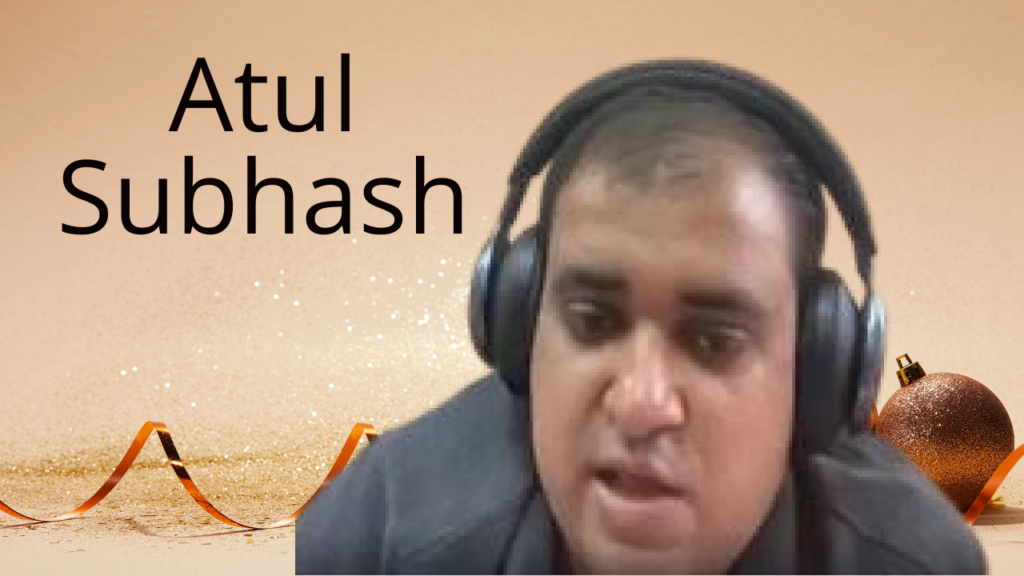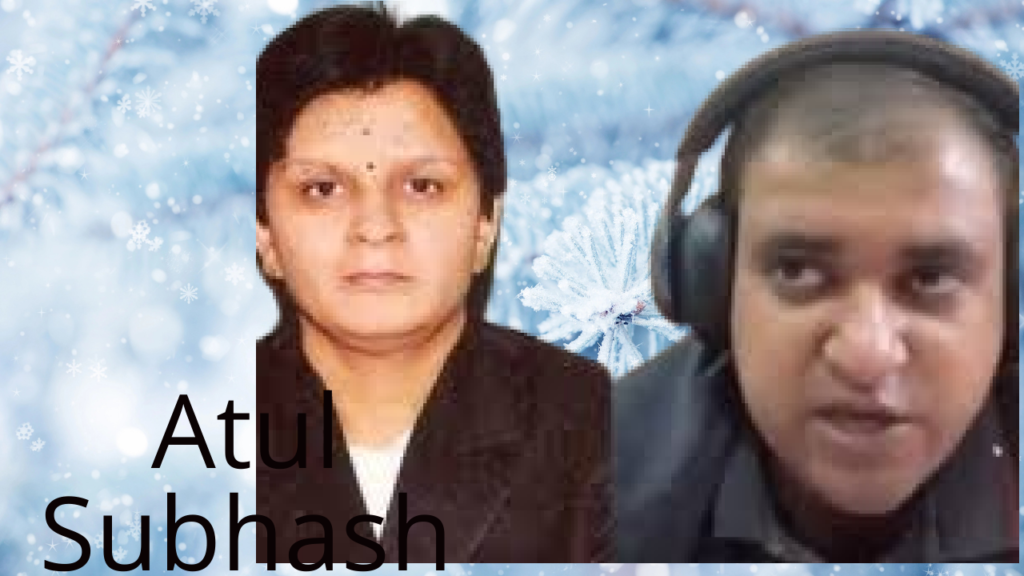Tragic Suicide of Atul Subhash: Family Court Failures, Harassment Allegations, and Urgent Reforms Highlightedy
Introduction:
To put it briefly:
Atul Subhash committed himself, claiming that his wife and family had been harassing him for a long time.
The intricacies of parental separation, child custody, and structural inefficiencies in family courts were highlighted by legal experts.
They emphasized the family courts’ excessive workload and demanded institutional changes.
Table of Contents
The Incident:
The tragic case of a 34-year-old software engineer from Uttar Pradesh, Atul Subhash, who died by suicide in Bengaluru, has shed light on the darker side of the family court system. In a detailed suicide note exceeding 20 pages, along with a video, Subhash described his history with his wife, ongoing legal battles, and their impact on his family and mental health, raising serious concerns about the system.
Suicide Instigation
Atul Subhash made grave charges against his wife, her family, and even the legal system in his suicide note, claiming that they drove him to the verge of ending his own life. However, it is unclear if this instance meets the strict legal definition of abetment to suicide after a closer look at the relevant legislative laws.
Court Cases Concerning Abetment
Examining the “elements” of abetment has been highlighted by the Supreme Court and other High Courts, especially in cases where women have committed suicide as a result of maltreatment from in-laws. Although suicide notes or dying declarations are seen as important evidence, courts have ruled that they are not always enough to condemn someone under abetment laws.
A direct or indirect act of incitement, active participation by the accused, and a tight temporal relationship between the act and the alleged instigation are necessary for a case to qualify as abetment, according to the Supreme Court’s 2020 dismissal of charges against media personality Arnab Goswami.
The newly introduced Bharatiya Nyaya Sanhita (BNS) of India, much like the Indian Penal Code (IPC), outlines the concept of abetment under Section 108. It declares that anyone who encourages someone to commit suicide faces a maximum ten-year prison sentence and a possible fine.
The offense of “abetment of a criminal act” under Section 45 is also explained in detail by the BNS, including acts like provocation, conspiracy, and willful help in carrying out the act.

Information from the Suicide Note of Atul Subhash
In addition to describing two instances in which his wife and mother-in-law allegedly taunted him to take his own life, Atul Subhash’s note goes into detail about the anguish his wife’s acts have caused him. These incidences took place this year in March and April. The question of whether these acts were the “proximate or direct” factor in his choice to commit suicide becomes crucial.
Legal Background: Laws Governing Maintenance
In the event of a marital breakdown, the legal structure for maintenance—which is mainly described under Section 125 of the CrPC—aims to prevent women and children from becoming destitute. In its 2020 ruling in Rajnesh v. Neha, the Supreme Court set rules for uniform maintenance awards that take into consideration the salaries of both spouses, the length of the marriage, the requirements of the child, and the social and economic standing of both parties.
Even a “deserving husband” may seek maintenance from his wife under Section 24 of the Hindu Marriage Act if his income is not enough to cover his expenses during the divorce process. In some situations, Section 25 also gives judges the authority to provide a husband lump-sum or permanent support.
Systemic Issues
Courts have noted that most cases go unresolved for years, even though statutory rules require that interim maintenance actions be handled promptly. Under statutes like the Protection of Women from Domestic Violence Act and the CrPC, maintenance awards may also be adjusted in response to changes in financial circumstances, such as remarriage or job loss.
This case highlights the human cost of structural inefficiencies as well as the pressing need for family court changes to stop tragedies like this one.
Court backlogs and maintenance delays
According to the Rajnesh case, there are a number of reasons why maintenance awards are frequently delayed, including the excessive workload on family courts, the parties’ continuous requests for adjournments, and the length of time it takes to finish arguments, even during the interim phase. In other decisions, courts have also said that maintenance payments can be changed in response to a husband or wife’s changing circumstances.
Separation of Parents and Child Custody
Child custody and the associated financial assistance are important topics in this conversation. When determining which parent should be granted custody, Indian custody laws give priority to the “best interests of the child.” Courts take into account the child’s mental and physical needs, the parent’s capacity to provide care, and other pertinent circumstances.
The Supreme Court has underlined time and time again that maintenance awards need to take the child’s expenses into consideration. These consist of essentials including clothing, food, housing, healthcare, and education. Child support also accounts for supplemental expenses such as extra coaching sessions or job training. Courts have made it clear, nevertheless, that these costs must be appropriate and not exorbitant.
The Supreme Court ruled in November of last year that a child’s education is usually paid for by the father. However, the costs might be split equally between the two parents if the woman works and makes enough money.

Syndrome of Parental Alienation
Parental Alienation Syndrome (PAS) is a condition in which the child develops an unfavorable opinion of the “other” parent as a result of the custodial parent’s words or behavior. In order to guarantee that the non-custodial parent gets frequent access to their child, the Supreme Court has issued decisions acknowledging this as a crucial consideration.
Despite these decisions, attorneys point out enforcement flaws. Custodial parents frequently decline to allow visits with the non-custodial parent, senior counsel Geeta Luthra told India Today TV. On the other hand, non-custodial parents may disregard court rulings and neglect to fulfill their visiting obligations. Luthra emphasized how crucial it is to establish visiting rights, unless there are established problems, such as abuse, violence, or drinking.
Family Court Systemic Failures
Prominent family conflict attorney Malavika Rajkotia called the IT worker’s suicide in Bengaluru a “systemic failure.” Rajkotia emphasized the ineffectiveness and emotional toll of the family court system, but she declined to comment on specifics of the case. She clarified, “Marital disputes reveal the cruel emotional side of litigants,” emphasizing the dearth of judges to manage the enormous volume of cases.
“Systemic dysfunction and party hatred are important issues that need to be addressed,” she continued. Judges in family courts are overworked, considering up to 120 cases every day.
Luthra agreed, highlighting the emotionally draining aspect of family law and divorce. She underlined that holding people criminally responsible for a spouse’s suicide could create a hazardous precedent and cautioned against abusing the legal procedures intended to protect women.
Issues with Custody and Access
According to Luthra, suicide instances connected to custody or access issues need for a sophisticated strategy. Invoking abetment to suicide in such circumstances may open a “Pandora’s box,” even while structural reforms are required. Enhancing child access, resolving parental separation concerns, and cutting down on delays in family court proceedings are all crucial areas for reform, according to Luthra and Rajkotia.
Luthra came to the conclusion that “many people feel hopeless because they can’t see their kids.” Even if a straight link between death and legal action isn’t always possible, we must start treating access rights seriously in order to stop more tragedies.
Family Court Mental Health Concerns and Difficulties
“We must not overlook mental health issues,” Rajkotia underlined. She emphasized that not all courts have counselors and mediators with the necessary training. Even in Delhi, where this type of training is offered, the facilities are severely overburdened.
Family courts provide unique difficulties for smaller districts. The Atul Subhash case, according to advocate Tahini Sharma, who works in family courts in Bihar and Uttar Pradesh, is a “reality check” for the current system.
Similar problems come up in a number of the instances I manage. Judges and personnel in many district courts are unaware of the difficulties faced by men. Wives have given inaccurate information regarding their income on applications I’ve filed, but judges have ignored these problems. In one situation, the judge declared that they would give the maintenance matter priority and leave the application pending. Because due process is not respected in such circumstances, the process becomes punitive, Sharma clarified.
Systemic Issues and Gender Bias
The Save Indian Family Foundation’s Atul Kumar also drew attention to the system’s underlying prejudices. Senior judges don’t care as much about things like harassment and suicide. It’s common to downplay men’s despair, suicides, and kid separation,” he said.
He went on to say that attorneys frequently inflame marital conflicts by urging their clients to submit several applications and accusations. One significant problem is maintenance, for which the law has no upper limit. He claimed that attorneys frequently demand larger maintenance payments and keep a cut of the settlement.
Kumar emphasized how men are not given the same consideration when they face financial difficulties. What occurs if someone want to go to a lower-paying position or loses their current one? Immediately, it is thought to be a purposeful act. People are unaware of how quickly jobs may be lost in industries like technology and information technology,” he said.
Atul Subhash’s Tragic Case
The community in Bengaluru was rocked by the suicide of an auto executive on Monday. A tense family court dispute was going on when the tragedy occurred. It is claimed that he resorted to this step following demands from his wife and in-laws, who allegedly asked for ₹3 crore to withdraw the charges against him, along with an additional ₹30 lakh.grant him visitation privileges with his son.
After Vikas Kumar, Atul Subhash’s brother, complained to the police, Atul Subhash’s wife Nikita Singhania, her mother Nisha, brother Anurag, and uncle Sushil Singhania were charged with aiding and abetting suicide.
Since the start of the legal battle, my brother Atul Subhash was exhausted both physically and mentally. During court proceedings, his in-laws made fun of him, telling the police that if he was unable to pay or obtain visiting privileges, he should die. “He took this action for this reason.”
Information on the Event and Its Repercussions
On Monday morning, Atul Subhash, 34, was discovered dead in his Marathahalli, Munnekolalu, residence. He left behind a video and a 24-page farewell note detailing how eight “false” police reports and family conflicts drove him to despair. He stated his plan to take his own life in an email to a non-governmental organization that supports men’s rights.
A family court judge in Uttar Pradesh, where the divorce and child custody disputes were still pending, was accused of being prejudiced in favor of his in-laws in the death note. Atul Subhash talked about his difficulties and the toll they took on his mental health in the video he shot before he passed away, which has now gone viral.
Atul Subhash remarked, “It is better to end my life than to watch my enemies get stronger with the money I earn,” in reference to the financial demands. I’ll be destroyed with the same money. This cycle will go on. The police and court system that harasses me and my loved ones is even funded by the taxes I pay. I have to stop giving my oppressors resources. They’re already saying that I should commit suicide.
An Appeal for Fairness
In a sincere plea to the authorities, Atul Subhash requested that his wife and in-laws not be allowed to come near his body. He asked that his funeral not be held until his oppressors had been held accountable. Throw my ashes into a drain by the court if they are released in spite of everything, he said, “so I can understand the value of life in this country.”
In his farewell letter, Atul expressed his profound regret for the suffering caused and apologized to his parents for not being there to care for them in their later years.
Conclusion:
In summary, Atul Subhash’s tragic case serves as a sobering reminder of the systemic difficulties, inefficiencies, and psychological costs connected to family conflicts and court cases. His passing emphasizes how urgently the family court system needs to be changed to guarantee equitable treatment, prompt case settlement, and concern for the mental health and general welfare of all parties. To avoid such tragedies in the future, structural reforms are necessary, including lowering court backlogs, eliminating gender prejudices, and incorporating mental health support. Atul’s narrative also emphasizes how crucial it is to promote justice and empathy within the legal system in order to give people dealing with such very emotional disputes a sense of justice and closure.empathetic family law framework.
